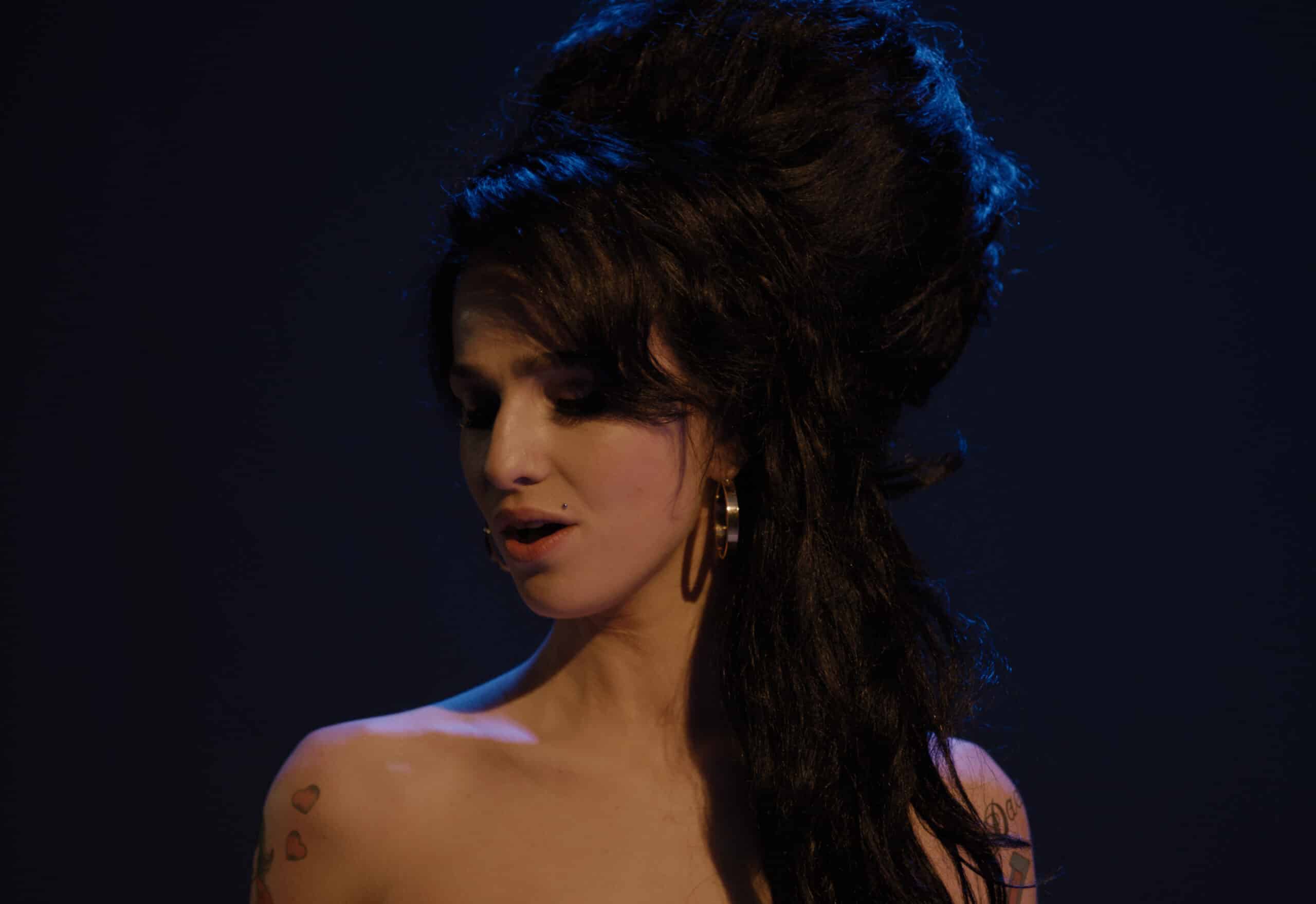




Dir: Sam Taylor-Johnson | Cast: Marisa Abela, Eddie Marsan, Jack O’Connell, Lesley Manville, Bronson Webb, Harley Bird, Juliet Cowan | UK Musical Biopic 122′
Star biopics stand or fall on the quality of their central performance. We generally resent the idea that anyone could step into the shoes of a beloved artiste, particularly one who is no longer here. “No one can be David Bowie,” we scoff, writing off films like “Stardust” before we’ve even seen them. It takes a lot to convince us otherwise.
So it should be said straight off that Marisa Abela’s performance as Amy Winehouse in Back to Black is astonishingly, blindingly good. She’s got the look, she’s got the strut, the attitude, the toughness, the vulnerability. But what about the voice? No one sings like Amy, right? Does Abela mime, or does she try to sing and, inevitably, blow it spectacularly?
Well, actually neither. Abela does her own singing, and she has the Amy voice down. The electric current that plugs you directly into the singer’s nervous system, the riveting delivery that won’t let your attention stray one iota from the woman at the microphone.
It doesn’t feel so much like impersonation as wholesale possession (although it’s clearly the result of great craft and technique), and I frequently forgot that I wasn’t watching the real Winehouse. But what does it say about Amy’s raw authenticity that it can be recreated so completely by another gifted performer? Maybe this irony is one reason for the aggrieved noises from some uber-fans. Maybe it’s possible to pay tribute all too well.
We probably shouldn’t go to Back to Black for a deep understanding of the motives and inner life of its protagonist. After all, we watched the unravelling in real time, on TV, splashed across tabloids, in concert, so we should have a few working theories. Amy had a stellar talent, and a rage for music’s capacity to express extreme emotions. Maybe she began to create drama in her life which she could mine for songs. Maybe she developed a taste for ever-darker material. And maybe the feedback loop span out of control and she was consumed by drama that couldn’t be controlled or reconciled.

The film shows us Amy’s family (surely too loving to be blamed for her demons?), her agents and managers (but no sighting of Mark Ronson), and Blake Fielder-Civil, the great love of her life, played with lithe physicality by Jack O’Connell. Blake starts the film as a strutting jack-the-lad, diminishes into a venal, battered toy-boy husband, and ends it struggling out of drug dependency, mumbling his prison psychiatrist’s script about toxic co-dependent relationships as he makes his final break with Amy. “You should be stronger than me,” goes the refrain of one of the early songs. But Blake obviously wasn’t.
“I’m an anachronism”, she tells him at one point, and despite the film’s stated aim to rescue and celebrate Amy – just as she wanted to restore jazz to its rightful place in pop culture – it seems to agree with the sentiment. The mercurial singer is framed in a rapidly receding world of cobbled streets, Victorian railway arches, pubs where you can still smoke, and pop performers who refuse to be moulded by their handlers.
Back to Black will stand as a monument to Amy’s London. Golders Green Crematorium, Primrose Hill, Camden Town pubs The Dublin Castle and The Good Mixer, the London Zoo and Soho Square and other landmarks make appearances, all captured in fine, muted colours. The score by Nick Cave and Warren Ellis is similarly subdued, mostly ominous drones and strings playing figures in low registers, wisely avoiding any clash with the Winehouse style.
An image of a caged canary is lingered on a few times too often – yes, we get it – but Amy teetering on crazily high pink shoes at her Glastonbury performance (itself a memorable set-piece) sums up her reckless abandon as well as anything here: flirting shamelessly with the audience, over-sharing about her private life, staying upright through sheer stubborn will and a little help from the roadies, and singing as if her life depended on it – which it probably did.
The world didn’t know it needed a torch singer with punk attitude until Amy Winehouse came along, but she thought differently. And it certainly missed her after she’d gone. @IanLong
IN UK and IRISH CINEMAS from 12 April 2024